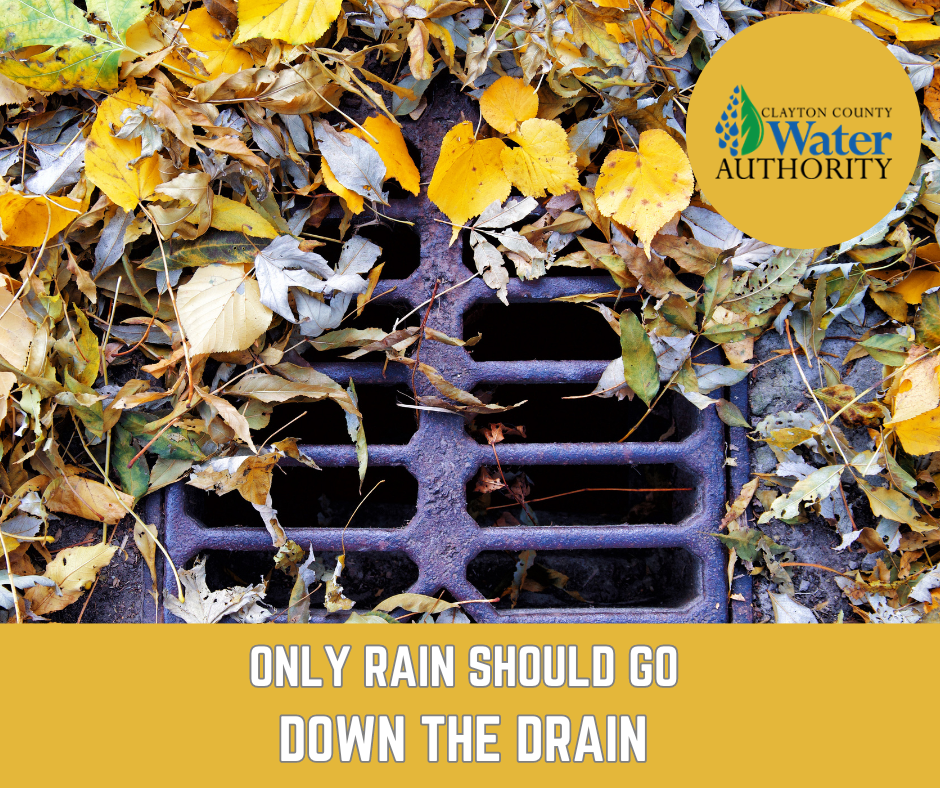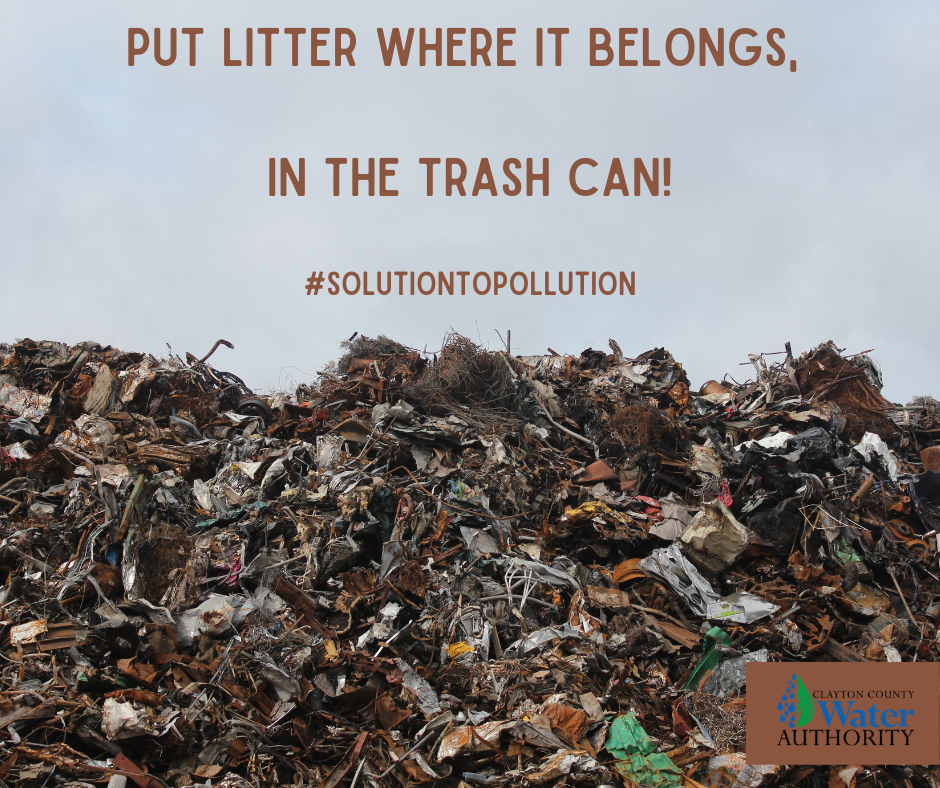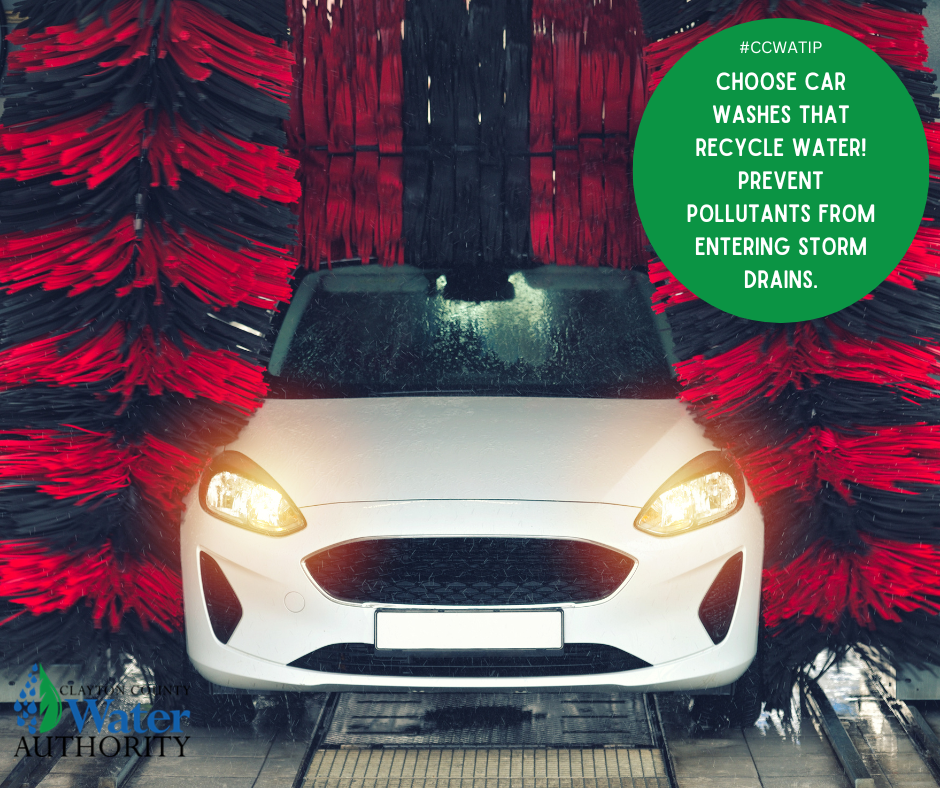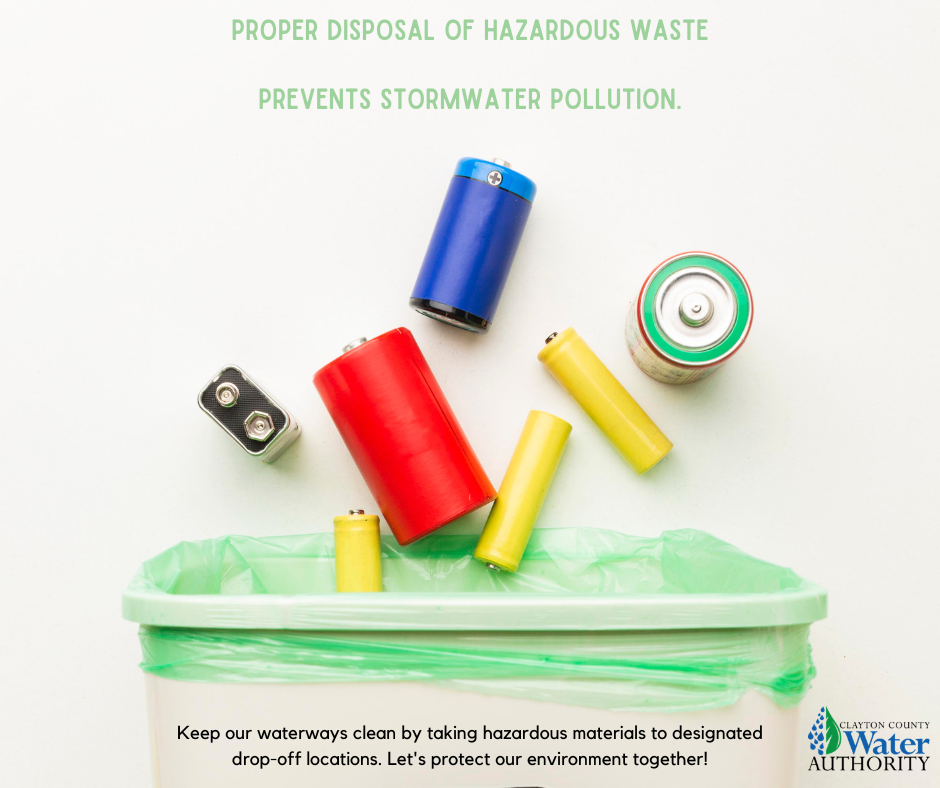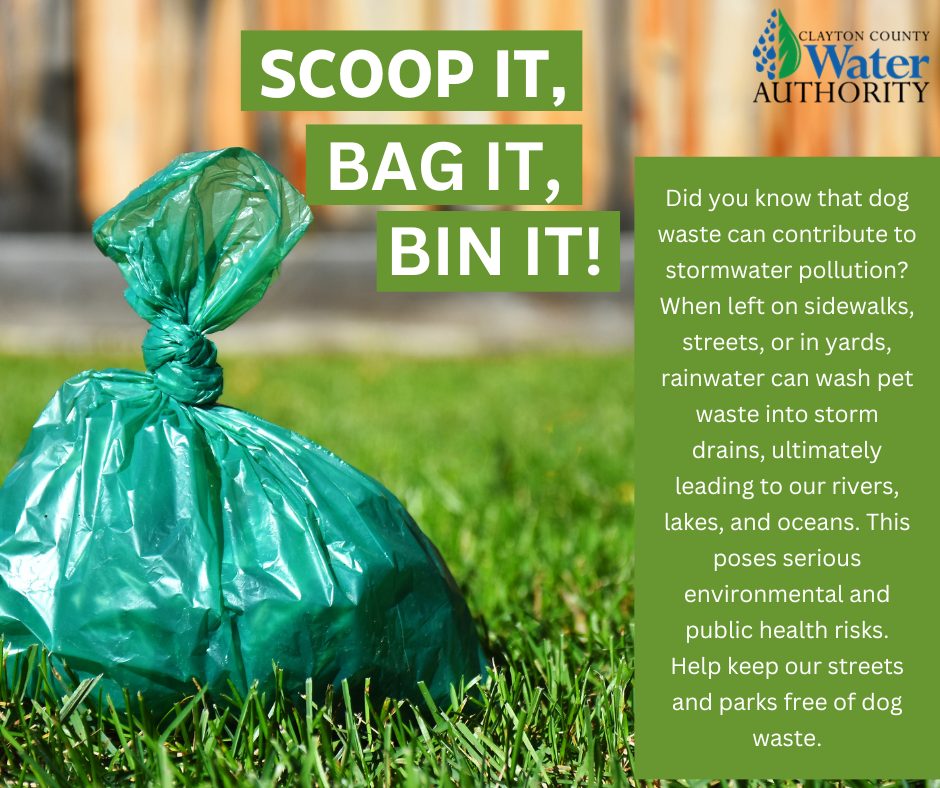What is Stormwater Pollution?
When it rains, impervious surfaces such as driveways, parking lots and rooftops can cause stormwater to ‘runoff’ into ditches, storm drains and other stormwater infrastructure. This runoff picks up trash, chemicals, dirt, yard waste, animal waste and other pollutants that get into our lakes, streams, rivers and eventually our reservoirs that are the community’s water supply.
Many people believe that everything in a storm drain goes through a treatment process like wastewater. However, CCWA’s stormwater infrastructure is not tied into our sanitary sewer system. This means everything that makes its way into a storm drain, stream or creek winds up in our raw water reservoirs.
These types of pollutants can also be considered illicit discharges. A key component of effective stormwater management to help protect water resources is known as Illicit Discharge Detection and Elimination or IDDE. Illicit discharges can include dirt, chemicals, trash, debris, pathogens (from animal waste) as well as leaks and illegal connections to the stormwater system.
If these items ultimately get washed into our drinking water reservoirs and local creeks, it will impair water quality. This can affect recreational activities such as swimming and fishing, can damage local habitats for plants and animals, and can even lead to increased costs for water treatment.
Detecting illicit discharges can be challenging if the sources are intermittent or hidden, but it doesn’t take any special training or equipment to spot some sources when you’re out in the community. All you need is a sharp eye, awareness of what can harm our local environment, motivation to report what you see, and commitment to ensure your day-to-day actions are not contributing to the problem.
It is important to keep our stormwater infrastructure, streams and creeks free of any harmful items that could wind up in our drinking water reservoirs.
Here is a list of helpful hints on ways you can help protect our waterways. Visit www.cleanwatercampaign.org for even more ideas.
Protect Our Waterways with These Stormwater Pollution Prevention Tips
Household Hazardous Waste
Every day you use chemicals in and around your home that can be hazardous to your family, pets and wildlife. It is important to dispose of these chemicals properly to ensure they don’t pollute our environment.
Products that are labeled as poisonous, toxic, corrosive, volatile, flammable, combustible or explosive or those that have alerts such as Danger, Caution or Warning, contain chemicals that are hazardous.
What can YOU do?
- If you have leftover hazardous household chemicals, recycle and dispose of products properly. CCWA typically holds a Household Hazardous Waste Collection Day event for County residents every spring. You can also go to earth911.com to find local recycling center near you or contact your local government for information on proper disposal and collection events.
- Buy only what you need. You’ll prevent having leftovers and the need to dispose of them.
- Never pour materials or products down the storm drain, drainage ditch or surface waters.
- Purchase non-toxic or the least toxic material and products for the job.
- For cleaning products, consider making your own.
- Always follow the directions and guidelines listed on the product.
- Store products in their original packaging in covered areas such as a shed or garage.

Information provided by www.cleanwatercampaign.org
Trash & Litter
We’ve all seen it: paper, aluminum cans, plastic wrappers, unwanted food, plastic bags and bottles, cigarette butts, diapers and more on the side of the road or on the sidewalk. Small amounts of litter around your home and neighborhood contribute to a big water quality problem. Trash and litter clog storm drains and cause flooding, which can damage homes and businesses. Trash and litter that does pass through the storm drain or travel down a drainage ditch washes directly into nearby rivers and streams, harming drinking water supplies, wildlife and recreational use of our rivers and streams.
What can YOU do?
- Never put anything in the storm drain or drainage ditch.
- Properly dispose of trash before it becomes litter.
- Keep garbage can lids secure.
- If you see litter and trash in your neighborhood, pick it up and properly dispose of it.

Information provided by www.cleanwatercampaign.org
Pet Waste
When pet waste is left on sidewalks and lawns, it is carried into nearby rivers, lakes and streams when it rains, polluting the water and creating a health hazard for people. Whether you live in a big city, small town or rural area, picking up after your pet is part of being a good neighbor and responsible pet owner. And in most places, it’s the law.
Doing the right thing is easy. Pick up after your pet every time. SCOOP the poop, BAG it, TIE it closed and TOSS it in the trash.
What can YOU do?
- When walking your pet, take a bag with you. Tie the bags on the leash if you don’t have a pocket or pack.
- Keep a supply of bags handy near your dog leash, by the door or in your car.
- When at home, long-handled “pooper scoopers,” available at pet stores, make it easy to pick up after pets without bending over.
- Make use of “pet waste stations” in your neighborhood or local park.
- Help spread the word! Talk to your family and friends about stormwater pollution and picking up after their pets.

Information provided by www.cleanwatercampaign.org
Lawn & Yard Care
Your yard may not be as “green” as you think. Excess fertilizer and pesticides can wash off your lawn when it rains and pollute nearby rivers and streams. Yard waste such as leaves, and grass clippings can clog storm drains and harm water quality. It’s especially important not to rake or blow grass clippings, leaves, or any yard debris into the street as these can be easily washed into catch basins during storms.
How you care for your lawn and yard can have a great impact on the water quality of our local rivers, lakes and streams. Be the solution to water pollution by following these tips and make sure anyone who helps you with yard maintenance follows them too.
General tips:
- Add plants to bare areas in your yard or cover with mulch to avoid soil erosion.
- Refuel and wash lawn equipment away from streams or where runoff drains to a storm drain or drainage ditch.
- Properly dispose of old oil, gasoline and yard chemicals.
- Inspect irrigation systems periodically to ensure that runoff is not occurring.
- Consider installing a rain barrel to reduce runoff from your property.
Fertilizer and Pesticide Application:
- Consider using native plants. They require less maintenance and chemicals.
- Follow all product instructions for proper application of fertilizers and pesticides.
- Properly identify weeds, diseases or insects before applying a pesticide. Spot treat only affected areas.
- Close spreaders when going over pavement, bare soil and other non-vegetated areas.
- Avoid using fertilizers and pesticides during drought conditions or when heavy rain is predicted.
- Store fertilizers and pesticides in enclosed, covered areas.
Yard Waste Cleanup:
- Don’t blow grass clippings and leaves in the street or down a storm drain. These can clog the storm drain and other stormwater infrastructure and could cause backups and flooding in your yard or street.
- Compost grass clippings, plant trimmings, leaves and other plant material, or bag them for curbside pick-up.
- Another option is to leave grass clippings or leaves on the lawn. Use your lawn mower to shred leaves into smaller pieces so they break down more quickly. Leaves and grass clippings release nutrients as they break down providing you with a chemical free, no-cost fertilizer. Plus, you save time by not bagging all the clippings and leaves.

Information provided by www.cleanwatercampaign.org
Car Washing
Many people wash their vehicles at home, but doing so on your driveway or street can pollute nearby rivers, lakes and streams. All of the soapy water runs down a curb and into the nearest storm drain where it flows right into a river or stream. Soap and detergents pollute water with ingredients such as phosphorus and other harsh cleaning chemicals. Used rinse water can contain oils and grease, suspended solids, heavy metals and other toxic substances that pollute water.
What can YOU do?
The next time you wash your car or truck, think about all of the pollutants that collect on your vehicle that make it dirty. Then, think about where your soapy water could end up. Be the solution to water pollution by following either tip:
Take your vehicle to a commercial car wash that recycles water. Commercial car washes are better than your driveway because their drains are connected to a sewer system and the wastewater will be sent to and cleaned by a wastewater treatment plant.
– OR –
If you must wash off your vehicle at home, do it on a part of your yard where the grass and/or soil can serve as a natural filter to absorb pollutants.
- Use products that will not harm the environment.
- Use an auto-shut off nozzle or low-volume or pressure to reduce over spraying and wasting water.
- Wash your vehicle when needed rather than once a week.

Information provided by www.cleanwatercampaign.org
Car Maintenance
Oil, antifreeze and other fluids from your vehicle that end up on your driveway or street will eventually be carried by stormwater to the nearest river, lake or stream when it rains. Small oil leaks and other vehicle fluids can add up to a big problem for our waterways.
What can YOU do?
- Never dispose of vehicle fluids into a storm drain or drainage ditch. Recycle oil and other fluids.
- Inspect and maintain your car regularly to prevent leaks of oil, coolant and other vehicle fluids.
- Never work on a vehicle in the street or near a stormwater drain or drainage ditch.
- Perform maintenance work on a flat concrete surface where spills can be easily cleaned up.
- Place a tarp, ground cloth, sheet of plywood, cardboard or newspaper under a vehicle to capture any leaks or spills.
- Always use a funnel when pouring liquids to avoid spills.
- Use a drip pan under a vehicle when changing fluids, unscrewing filters and removing other parts that might leak.
- Immediately clean up vehicle fluid spills with rags or other absorbent materials such as kitty litter, sawdust or oil absorbent.
- Recycle used tires and batteries.
- Go to www.earth911.com to find a local parts stores and service stations in your community that will recycle vehicle fluids, batteries, oil filters and parts.

Information provided by www.cleanwatercampaign.org


